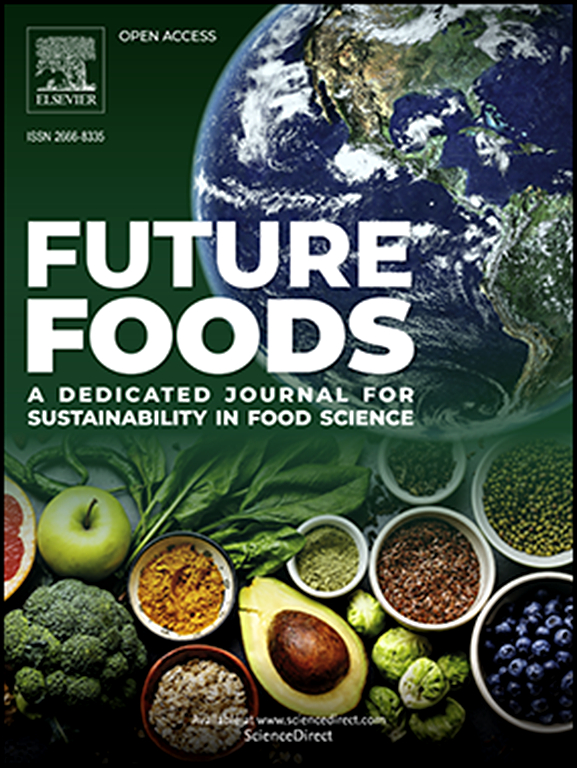下一代食品配料的精密发酵:机遇与挑战
IF 8.2
Q1 FOOD SCIENCE & TECHNOLOGY
引用次数: 0
摘要
精密发酵是传统发酵的一种高级工艺,其中微生物,如细菌、真菌或酵母,被基因修饰以产生所需的产品。它是一种先进的生物技术方法,用于生产特定的食品成分,如酪蛋白和柠檬酸。精密发酵的完整性在于尖端技术,通过插入所需的基因来提高微生物的效率,并以更高的效率生产高价值的化合物。所有涉及的尖端技术在集成、快速原型和预测能力方面都是协同的。自动化和人工智能(AI)增强了合成生物学预测和代谢工程,实现了迭代的菌株改进周期。菌种的选择和优化是精密发酵工艺成功的基础。自动化允许在短时间内测试几种应变变化。人工智能工具指导下的代谢工程工作有助于评估基因变化对生产的影响。依靠精密发酵的可扩展和可持续替代传统方法已经变得更加明显。精密发酵通过提高资源效率、最大限度地减少浪费和减少对环境的不利影响,正在成为对可持续和可扩展的食品生产方法的高需求的解决方案。本文综述了精密发酵技术的最新进展及其在食品工业中的潜在应用。此外,本文还讨论了精密发酵如何创造定制的食品成分。它还解决了最近消费者对个性化营养、植物性替代品和无过敏原产品需求的增加。本文讨论了精密发酵的技术进步和更广泛的社会影响,提供了对这一领域如何改变食品工业的见解。最后,我们讨论了在充分利用精密发酵潜力的未来食品配料生产中所面临的挑战和机遇。本文章由计算机程序翻译,如有差异,请以英文原文为准。

Precision fermentation for the next generation of food ingredients: Opportunities and challenges
Precision fermentation is an advanced process of traditional fermentation wherein microorganisms, such as bacteria, fungi, or yeast, are genetically modified to yield a desired product. It is an advanced biotechnological method for producing specific food ingredients, such as casein and citric acid. The integrity of precision fermentation lies in cutting-edge techniques that enhance the efficiency of microorganisms by inserting desired genes and in producing high-value compounds with greater efficiency. All the cutting-edge techniques involved are synergistic in terms of integration, rapid prototyping, and predictive power. Automation and artificial intelligence (AI) enhance the synthetic biology prediction and metabolic engineering, enabling iterative strain improvement cycles. Strain selection and its optimization are a strong foundation for successful precision fermentation process. Automation allows testing of several strain modifications in a short duration of time. Metabolic engineering efforts guided by AI tools help in assessing the outcome of genetic changes on production. The reliance on precision fermentation for a scalable and sustainable alternative to conventional methods has become more evident. Precision fermentation is becoming a solution for the high demand for sustainable and scalable food production methods by improving the efficiency of resources, minimizing waste production, and reducing the adverse environmental impact. In this review on precision fermentation, we have thoroughly examined recent advancements in precision fermentation techniques and their potential applications in the food industry. Additionally, the review discusses how precision fermentation can create customized food ingredients. It also addresses recent increase in consumer demand for personalized nutrition, plant-based alternatives, and allergen-free products. This present article discusses the technological advancements and the broader societal implications of precision fermentation, providing insights into how this field is poised to transform the food industry. Finally, we conclude by discussing the challenges and opportunities that lie ahead in fully utilizing the potential of precision fermentation for the future of food ingredient production.
求助全文
通过发布文献求助,成功后即可免费获取论文全文。
去求助
来源期刊

Future Foods
Agricultural and Biological Sciences-Food Science
CiteScore
8.60
自引率
0.00%
发文量
97
审稿时长
15 weeks
期刊介绍:
Future Foods is a specialized journal that is dedicated to tackling the challenges posed by climate change and the need for sustainability in the realm of food production. The journal recognizes the imperative to transform current food manufacturing and consumption practices to meet the dietary needs of a burgeoning global population while simultaneously curbing environmental degradation.
The mission of Future Foods is to disseminate research that aligns with the goal of fostering the development of innovative technologies and alternative food sources to establish more sustainable food systems. The journal is committed to publishing high-quality, peer-reviewed articles that contribute to the advancement of sustainable food practices.
Abstracting and indexing:
Scopus
Directory of Open Access Journals (DOAJ)
Emerging Sources Citation Index (ESCI)
SCImago Journal Rank (SJR)
SNIP
 求助内容:
求助内容: 应助结果提醒方式:
应助结果提醒方式:


